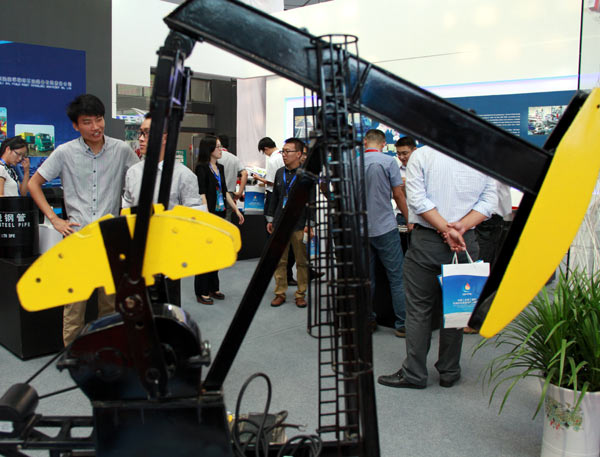

|
 A company displays a model of an oil pump at an energy trade show in Dongying, Shandong province, in September. [Photo / Provided to China Daily] |
The United States may soon be ceding its title as global economic leader to China, but the Western nation still holds the edge in generating original, innovative ideas. That said, an air of satisfaction with the status quo has infected individuals as well as organizations in the US and threatens to hinder the implementation of some of its smart strategies.
Take energy, for instance. Holding most of the world's patents in energy innovation, the US has blazed a trail in renewable energy systems, the construction of energy-efficient structures and pushing for more fuel-efficient and electric cars. But despite the proven financial, environmental and competitive advantages of energy efficiency, getting both a grassroots and a corporate buy-in for the concept in the US has been slow.
Dan Arvizu, director of the US Department of Energy's National Renewable Energy Laboratory, attributes an air of "complacency" to relatively low US energy prices, diminishing the urgency for innovation.
"Our prices make us competitive," Arvizu told China Daily on the sidelines of the 2013 Platts Global Energy Outlook Forum in New York last week. "But they also make us complacent."
Even if implementing energy-efficient change is in someone's best financial interest, he said, "the perception is: 'I've got to make a compromise on how I do things to take advantage of these new technologies'".
So, why aren't good ideas implemented? Arvizu was asked. "First, people need to know if it's possible," he replied. Thus, if people don't know if an innovation is actually implementable, they won't pursue it.
Second, he said, "they actually have to care". Using energy efficiency as an example, he said that if people think "energy's not my problem, it's a tolerable cost", they're "not going to spend any time" with the concept.
The implications of these views are significant, according to Arvizu. The US needs to get innovative technologies into the marketplace quickly to wring the maximum benefit from the competitive edge it still holds, before China ramps up its pursuit of world energy business, luring investors with low-cost technology.
No doubt China is learning from studying the US.
Arvizu said that a Chinese delegation that recently visited the Research Support Facility (RSF) at the US Department of Energy's National Renewable Energy Laboratory (NREL) in Colorado came away impressed with the myriad cutting-edge energy-saving ideas on display. Completed in 2011 at a cost of $103 million, the 33,445 sq m facility operates with 1,300 staff members and an energy goal of 3.15 kilo British Thermal Units (or 35,000 Btu) per sq m per year.
"We have a 70-watt budget per person," Arvizu said. Whereas conventional desktop office computers alone consume some 300 watts of electricity, the RSF employees use 15-watt monitors. And "everybody uses one centralized printer".
Throw in the building's rooftop photovoltaic system, its electrochromic windows (that respond to changing sunlight levels and heat conditions) and systems that advise workers when it's a good time to open or close windows), and the result is a 50 percent reduction in the energy consumption of even "the most efficient" mainstream building built to code, Arvizu said.
China, clearly committed to embracing an advanced energy economy - it moved over to a clean energy policy in its latest five-year plan - seems well-positioned to gain on the US. An increasingly fractious political debate on energy and climate issues in Washington threatens to cut back such programs as state renewable energy standards and federal tax credits for wind and solar power.
Arvizu suggests that the next generation of Americans will be more proactive when it comes to widespread energy-innovation adoption.
Through giving talks at US colleges and universities, the director has reached the conclusion that "younger people get it" and that "my generation has to die off before we finally get attention on these matters".
The current generation could help the cause of energy efficiency and renewable energy now, he said, by implementing numerous energy strategies that don't "require compromise". But the implication is that many people in the US would regard taking even those modest steps as challenging their entrenched views of energy use. And for many, that would mean taking a risk.
Apparently, some risk will be necessary, if the US wants to retain its competitive edge over China.